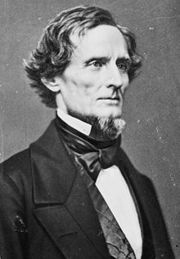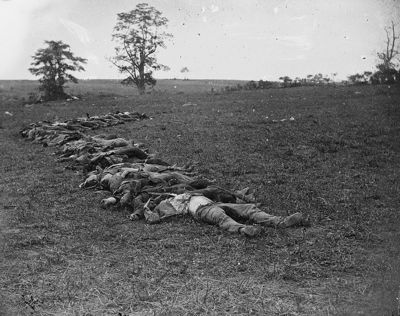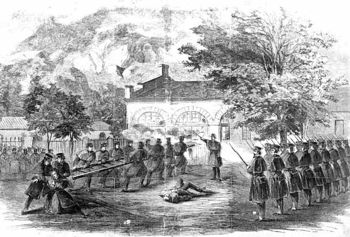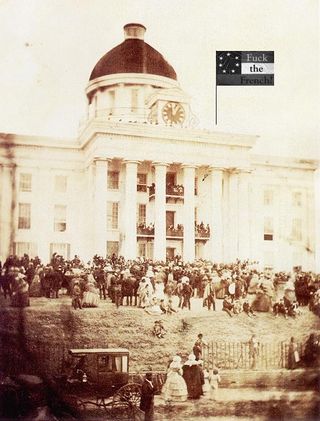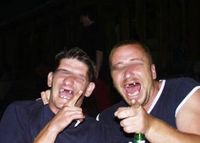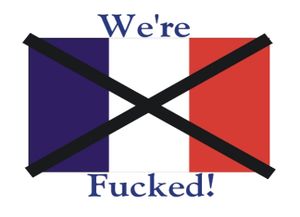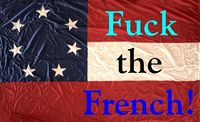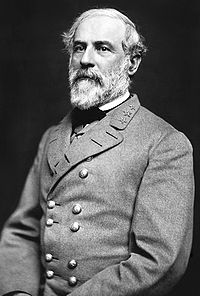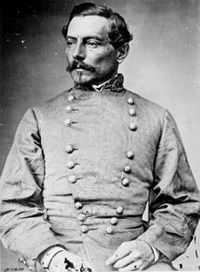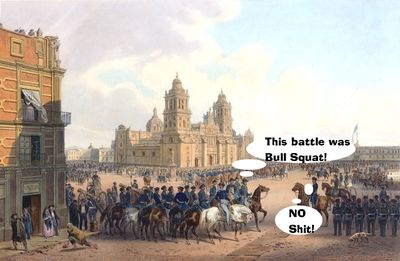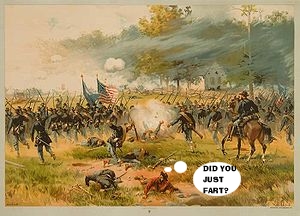Jefferson Davis
Jefferson F. Davis, as opposed to Jefferson C. Davis (no relation), was (and in the minds of some still is) the President of the Confederate States of America. Born in State of Kentucky, USA, in 1808, he died in the State of Louisiana, USA (or CSA, depending on your point of view) in 1889. He is most famous for leading a young nation of seceded states to one of the most glorious defeats in military history.
In an epic bit of statesmanship, he managed to alienate every nation on earth during the First Southern Uprising, except France (which, like most other nations and humans, he hated) and took a prosperous region of the United States and successfully reduced it to something slightly above the living standard enjoyed by Haiti after the 2010 earthquake. He owes this incredible talent to his military training, which he acquired after nearly being tossed out of the United States Military Academy at West Point, where he was known primarily for premature balding, a beer belly, and picking fights with Yankees, Southerners, and anyone from Puerto Rico.
After graduating near the bottom of his class, Davis was stationed at Fort Crawford, Wisconsin where he learned the art of cheese making at the foot of Colonel Harry "Stinkfoot" Limburger, a tradition much loved by Wisconsonians to this day and hated by anyone living down-wind of that state.
After successfully escorting Chief Black "Dude" Hawk to prison, at the request of his colonel (and later U.S. President) Zachary Taylor, in 1832 Davis fell in love with the colonel's daughter, Sarah Fortnox Taylor. Colonel Taylor did not approve of the match, telling his daughter "do you really want to marry a guy who makes bad cheese?" But that did not stop her from eloping with him in 1835 to Madison, Wisconsin, during the first of that state's many cheese festivals.
The Battle for Cheese[edit | edit source]
The couple settled at Davis's cheese plantation in Arm Pit, Mississippi. The marriage, however, proved short lived and Noxious, as she was known by her friends, died a year later when, tragically, it was discovered she was lactose intolerant. Davis was inconsolable and spent the next few years blaming the French for inventing cheese, which lead to his wife's death.
By now, though, Davis's neighbors had had enough of odor emanating from Arm Pit, and decided that the best way to get rid of it was to elect him to Congress, a tradition which continues to this day. While in the House, Davis again distinguished himself by being placed in the seat furthest from the Speaker and other representatives; they later passed the first of the many Anti-Limburger Cheese Acts (a tradition which, again, continues to this day).
Davis was incensed. He argued that it was unfair to permit only Wisconsin to make bad cheese, citing the fact that France, for years, had been allowed to do the same and no one stopped them. When it was pointed out to him that France was a foreign country and that the French seldom bathed, Davis reportedly cried out "neither do those who live in Mississippi" (again, yet another tradition that exists to this day). Many historians site this incident as the beginning of Davis's turn to the Dark Side of the Force and his tilt towards secession.
Following his stint or stink in Congress, he left for his home state and married Varina Vinegar Howell, daughter of Thurston Howell the First, former governor of New Jersey, and ancestor of the famed Thurston Howell the Third, who was reported lost with his wife, Lovey, while on a three-hour tour in the 1960s aboard the SS Minnow. They had six children together, Gouda, Cheddar, Swiss, Mozzarella, Parmigiana, and Feta, all of whom survived and had various cheeses named after them.
The Cheeseheads[edit | edit source]
In the 1846 the Mexican-American War broke out when Texas closed the border to Mexican imports of drugs, toffee, and Dos XX, telling the Mexicans it was "better to stay thirsty my friends" than to drink their beer or their water. The Mexican leader, Satan "Santa" Anna, subsequently declared war on the United States. Soon after the war commenced, Davis was recalled to active duty. He raised a brigade of Mississippi troops known as the Cheeseheads, which were mustered into the army under the command of his former father-in-law, the now-General Taylor, who was appointed to head the invading army.
The Cheeseheads fought bravely under Davis in several engagements. Many towns along their march were, in fact, found to be totally evacuated prior to the arrival of the Cheeseheads, due to their incredible smell. In one engagement, known as the Battle of Buenos Natchos, several thousand Mexican townspeople and soldiers, drank their own water in one of history's first mass suicides, when the odor of the advancing troops became too much for them to bear.
For his services, Davis was given the Congressional Medal of Honor. His commander, General Taylor, later apologized to his former son-in-law, and swore that if he was ever elected President of the United States, he would veto any further attempts to ban Limburger cheese (fortunately for America, President Taylor died not long after taking office and was unable to veto the Anti-Limburger Laws).
After the war, Davis returned to Mississippi, and was promptly elected to the Senate. His constituents felt that if he was gone for six years, instead of just two, that their state would begin to smell better and no longer be the butt of French jokes. After two years in the Senate, however, Davis resigned and sought the governorship of his home state. He was defeated by Harry "Biggie" Foote, who had run on a platform of "fresh air and good cheese" to become the first person ever to win a political office on an environmental/dietary platform.
Secretary of War[edit | edit source]
In an effort to keep Davis out of Mississippi, Foote later lobbied newly-elected President Franklin Pierce to appoint former Senator Davis as his Secretary of War. Pierce, known to be sympathetic to the South and a cheese lover in his own right, agreed and Davis was confirmed by the Senate shortly thereafter. During his tenure Davis upgraded the army, replacing the cavalry's horses with camels, whose smell was so pungent that it led to the invention of the Camel Dung brand of cigarettes (now known simply as Camels). Davis then turned his attention to culture and supported a bill, sponsored by Wisconsin Representative George G. Limburger (son of Harry Stinkfoot Limburger) in Congress to create the Smithsonian Institute.
Davis and Limburger wanted the Institute to be a facility dedicated to the study of cheese, specifically non-French cheese. But representatives from Michigan, and all states directly downwind from Wisconsin, along with Maryland and Virginia (where the Smithsonian was to be located) blocked passage of the bill, citing the fact that the people of their states would move to Canada to avoid the smell. That led to the Great Compromise of 1854, in which Limburger's bill was amended to permit building the Smithsonian ("a place to house old stuff") in return for a government grant to build a plant in Wisconsin (to make air-tight containers). The deal explicitly did not cover any cheeses being exported to France.
Back to the Senate[edit | edit source]
Following the defeat of Pierce in the election of 1856, Davis was once-again elected to the Senate, where he spent the next four years as Chairman of the Senate Dairy Committee. By now the people of his home state were quite happy to keep Davis far away as possible; many had even started to take up bathing regularly, while many others collapsed from being unable to cope with the freshness of the air. In the meantime his plantation was almost bankrupt, due to the drop in the value of cheese, and many hoped that it would soon go completely under, thus forcing Davis to find a new source of income or, ideally, move to Wisconsin where he had become some sort of folk hero.
Davis, however, vowed to return to Mississippi once his term in the Senate was over and promised to revive his cheese plantation. This prompted many people in his home state to consider the possibility of seceding from the Union and creating their own country. In this they were joined by several other Southern states, which feared that Davis might settle among them, instead, and start new cheese plantations. Then, in 1859, a singular event shook the entire country to its core: the famous "Raid on Harpers Ferry, Virginia, on John Brown."
Brown, a disgruntled dairy farmer from Iowa, feared that if the South seceded, he would lose his biggest market for bad milk, which was then being used by many Southerner slave owners as a dye to make their Negroes white. During a trip to Washington, D.C., to seek Davis's support for bill that would ban the use fresh milk in South, except for the making of grits (the South's largest export, after chewing tobacco and guys named Bubba) his train was attacked by crazed band of western Virginia Hillbillies as it passed through the town of Harpers Ferry. The people feared Brown was a really in cahoots with the Yankees, who they had long suspected of wanting Southerners to bathe regularly and would use the proposed legislation to force them to buy other products, such as soap and deodorant.
Brown was forcibly removed from the train and lynched. This created an outcry in the North, whose representatives in Congress blamed Davis, and his love of smelly cheese, for getting the Southerners all worked up. That, in turn, raised an even larger stink in the South, who feared that the Yankees would now demand that all Southerners quit dyeing their slaves white, and force them to bathe regularly too.
Secession – the Confederate States of America[edit | edit source]
This proved too much for many Southerners, who had felt that their body odor was the only defense they had against bad cheese. This lead Mississippi to secede from the Union in 1861, followed by South Carolina, Georgia, Florida, Alabama, Louisiana, and Texas.
Unfortunately for Mississippi, they miscalculated on one rather significant point. Their withdrawal from the Union prompted the resignation of ALL their Congressional representatives, including Davis. Fearing, once again, that his return would cause the revival of his cheese plantation, they immediately nominated him as their candidate for President of the newly-formed Confederate States of America. Meeting in Alabama, the representatives of the seceding states unanimously agreed to elect Davis as provisional President, provided he refrain from cheese-making for at least the next six years.
Davis agreed, with the stipulation that he be addressed hence forward as “The Head Cheese” and that he would be allowed to return to Mississippi and restart his plantation, once he left office. The delegates reluctantly agreed, believing that he was so old he might die in office.
The Head Cheese and the start of the war[edit | edit source]
Upon the inauguration of Abraham Lincoln as President of the United States in 1861, and his famous "Fuck you guys! You ain't leavin' shit" inaugural address, President/Head Cheese Davis prepared his young nation for war. After seizing all Federal property within the territory claimed by the Confederate States, he sent out emissaries to various countries to ask for aid and diplomatic recognition.
The only country, however, that was willing to offer any aid or recognition was France, which Davis refused to accept and then promptly declared war on. France, in keeping with their long established traditions, immediately surrendered, forcing Davis to send over troops to occupy Paris and prevent a flood of low-cost cheese from entering the South.
He also ordered the bombardment of Fort Sumter in South Carolina, which was still being held by forces loyal to the Union as of April, 1861. The Confederacy, however, lacked sufficient shells for a long-term fusillade and so they, naturally, turned to the one resource they plenty of; guys named Bubba.
Upon his election as President of the Confederate State, Davis had immediately cut off the flow of Bubbas to the North. He reasoned that the shortage of dumb, fat guys with only three front teeth, would cause incredible distress among Yankees attending carnivals and freak shows during the summer months. Without the local Bubba to poke fun at, President Davis felt that the Yankees would fall into a deep despair and that their low morale would infect many of the troops Lincoln would send south to fight to preserve the Union.
His strategy appeared to be working. Although it was still early in 1861, reports were filtering south that several shows were being canceled or postponed by disgruntled promoters whose Bubba supply had reached a crises point. Many towns, such as Buffalo, New York, and Pittsburgh, Pennsylvania, which relied on the income and employment provided by the carnie acts and clown shows (even more so than Washington, D.C.), were feeling the pinch. With several events no longer scheduled, nearly half the population of both cities found themselves out of work, except those who were already in elected office. In New York City, another major hub of freak show activity, people were protesting and rioting in the streets, demanding that President Lincoln negotiate with the South in order to 'Bring Bubba Back.'
Davis capitalized upon this. With Fort Sumter surrounded by his forces and their supply of food running low, he ordered his commanding General Weasel De Beau Rearguard (or General Dweeb, as he was better known) to send in the Bubbas. General Dweeb responded by contacting the fort's Union commander, Major Cook E. Munster, to surrender his position or he would be forced to use drastic measures to reduce it. Major Munster protested that between the lack of food and the low morale caused by not seeing any Bubbas lately, his troops were nearly finished anyways and that it was only a matter of time before they gave up of their own accord.
Dweeb replied that Munster's response was insufficient and notified him to tell his troops not to look outside the forts walls at mid day or they would be annihilated. Naturally, they looked...and found their position surrounded completely by guys named Bubba. The sight of so many dumb, redneck hicks was too much to bear for most of the Union soldiers. Many laughed so hard that they could not man their guns, while several dozen choked to death coughing up their lunches.
By 1 PM it was all over. By then almost 200 of the 300 soldiers still in Fort Sumter could no longer stand. Several had wet their pants with laughter and even Major Munster was seen being carried from the parapet, tears in his eyes and a dumb grin on his face. As a result of his incapacity, his second in command, Captain James C. Kangaroo met with General Dweeb and signed the terms of surrender. The Union soldiers marched out (those that could still stand and still had clean uniforms) and the Confederates marched in, the Bubbas having been withdrawn to a safe distance.
The war is Bubba-sized[edit | edit source]
The news of Fort Sumter's surrender flashed across the south like a naked homosexual on a bicycle. In towns from Redneck, South Carolina to Saywhat, Texas, people rejoiced. The Head Cheese, Davis, was elated but even though four more states offered to join the Confederacy, Virgina, Tennessee, Arkansas and North Carolina, he saw log rolls of curds and boulders of whey that still needed to curdle right before his nation's independence was secured.
President Lincoln had issued a blockade of Southern ports and ordered the confiscation of any Bubbas still at large in Union territory. He then issued a call for volunteers to form an army which would march south to reoccupy all the forts now in Confederate hands, including the capital of the Confederacy. The problem was that he wasn't sure where it was any more.
At the beginning of the conflict, the Confederate capital was in Montgomery, Alabama, which many thought was remote enough to keep the Head Cheese from stinking up the entire south. When Virginia joined the nascent nation, the Mississippians, still worried that Davis might no longer be able resist the urge to cut the cheese, and go back to his plantation. At their behest, therefore, the Confederate Congress passed a motion to relocate the capital to Richmond, Virginia.
At first, the Virginians protested vehemently. Although they liked the Head Cheese, they didn't like the idea of their foremost city being the main axis of any expected invasion from the North. But Davis prevailed on them, promising to defend their capital as if it was his own (which, of course, it was now). Quickly he set to work organizing the city for defense and brought on that most eminent of all Virginians to be his chief military advisory, General Robert (Chuck) E. Cheese. He didn't know it yet but in a war that had just become Bubba-sized, Davis had found the one man in the entire south with whom he could fondue with.
General Charles E. Cheese[edit | edit source]
General Cheese (Chuckie to his friends) was a master strategist and a brilliant tactician. His former commander in the Mexican War, General Whinefield Scott, called him "the best damn soldier in the country, and he makes a great Shirley Temple too – the drink, not the actress." But what set him apart from all the other generals in the Confederate army was his ability to deal with the sharp nature and strong personality of the Head Cheese. Although Davis felt himself to be the most eminent soldier in the South at the time the war started (based on his leadership of his beloved Cheeseheads), he saw in Cheese a kindred spirit and a man of action too.
Cheese was also a Patrician, much like Davis, having come from one of the finest families in all the South. Unlike Davis, however, Chuckie had not had any problems running his estate. After the price of bad milk spiked, following the lynching of Brown, Cheese abandoned his attempt to whiten the Negroes running his tobacco plantation and, instead, decided to accept them as being black, free them from slavery, and hire them back as paid laborers.
A few resisted this attempt at emancipation and went south in search of slavery and masters who respected them enough to continue their efforts to make them white. Those who chose to stay and work for wages made a fortune just prior to the outbreak of war; and many bought several Bubbas to entertain their children and the children of their now-employer.
When Virginia seceded, however, Cheese faced a daunting decision. Though he loved the Union and felt secession was wrong, he could not make up his mind to turn his sword upon anyone but the damn Yankees he blamed for causing this mess. So Cheese resigned his U.S. army commission and was appointed General-in-Chief of Virginia forces by Governor Hannibal Beans Lecture, prior to that state's admission to the Confederacy.
The other thing that Davis and Chuckie in common was that both were West Point men and both could be pompous asses as a result of it. To both prove that he was not only the Head Cheese and the bigger ass, the Confederate President kept most of power to run the war in his own hands. He was not a man to easily pass the cheese, nor did he particularly want too either. It wasn't long, then, that an opposition began to organize against him, finding both a voice a symbol in General Dweeb.
Dweeb and opposition to the Head Cheese[edit | edit source]
Dweeb did not feel he had been given enough credit for the capture of Fort Sumter. He blamed the Head Cheese for that, telling fellow officers that the President unfairly cut him out of the glory he deserved for his "Bubba strategy." Davis, in turn, replied that General Dweeb was a little pointed-headed Frenchman, a man who knew no more about military tactics than he did about serving good Brie.
According to Davis's wife, Varina, these personal battles really soured the Head Cheese, and his natural inability to get along with stupid French pipsqueaks "made it very easy for him hate Dweeb." The problem was that Dweeb was not a real Frenchman (had he been, he would have surrendered the argument without saying a thing) but a Creole from Louisiana; a Southerner just like Davis himself. It was, therefore, quite natural that these two people would clash. But, before things really crumbled between them, the Union army began its long-awaited advance into Virginia, aiming right for Richmond, now that they were sure the Confederate capital was actually located there (up until then, the Union army had been marching towards Columbus, Ohio).
The First Battle of Bull Squat[edit | edit source]
From the native American word that means "Fat Guy Taking a Dump in Creek," the Battle of Bull Squat began at dawn on July 22 on the shores of the Bull Squat Creek, and lasted until early evening, when both armies retired to their encampments to lick their wounds, their balls, screw prostitutes, drink beer, and complain about the food. The Head Cheese was aware that a battle was taking place but was too busy getting his picture taken to bother. When asked by a reporter for the Richmond Times how he felt about the impending battle the day before, Davis replied "well, those assholes singed up to die for their country and now they're going to have their big chance to do it." General Cheese managed the battle instead, fielding requests for troops and supplies from Generals Dweeb, John Stoner, and the apparent hero of the battle, General Harvey W. Banger. When it was over, the Confederates had cleared the field of Bull Squat, and driven the Union soldiers back towards Washington D.C.
Upon hearing the news of the victory, Davis was elated. "All right! We beat those mothers!" he said. He later raced over to the Dull House of the Confederacy and promptly took credit for the victory, saying "do you really want a guy named Dweeb and Chuck being thought of the masterminds behind winning this battle?" That, of course, did not sit well with General Dweeb or General John Stoner, who promptly resigned their commissions to take up basket weaving in Iowa.
General Chuck, however, developed a close personal relationship with General Banger, naming a drink in his honor, the Harvey Wall Banger. Banger went off to make trouble for the Union in the Shenandoah Valley, mostly by singing horrible songs and drawing dirty pictures of Abraham Lincoln's wife.
By now the Head Cheese had established the pattern of behavior that would mark him throughout the war; incompetence. Whenever the South won a battle he would take credit and whenever they lost one he would also take credit, not realizing that that was bad policy. The War with the French, having been won, and Paris occupied by Rebel Troops, President Davis was concerned with trying to get his forces back to the Confederacy. He, like all Southerners, was worried that if they stayed there too long, they would all come down with the Clap and stop shaving their armpits too. That would not do because armpit hair was found to be useful in seasoning grits and making gun power. AS for the clap, the worry was that without it spreading through the women of the South, their men-folk would have less reason to stay away from them and quit the army in droves, a factor that M/M.I.(Moron/Military Intelligence) was deeply concerned about.
Also the blockade was starting to tighten around the balls of the Confederacy. The Bubba supply situation was getting critical as Southern women were continually making them but could not export them. The North, like other parts of the world, had already found another bunch of hicks they could easily import, namely the Irish. The Irish proved to be very good at being stupid (especially when they weren't drinking, which wasn't often), though not nearly as effectively as the Bubbas, but it was just enough to keep the Yankee Freak Shows in business. That stabilized the Northern economy but played havoc with the South's.
Soon blockade runners started to capitalize on this virtual monopoly in Bubbas. They realized that if they could export them early enough they could still make money. Branding them as "cattle" or "a sack of hammers" many smugglers were able to sneak them past Rebel officials, who often failed to tell the difference.
Davis thought of using the Bubbas as possible soldiers, but the Confederate Congress declined his request, saying that it was inhuman to allow stupid people to get shot; smart people, okay, but not dumb guys. In the meantime, Davis, citing the shortage of bad milk from the North, decided to emancipate the black slaves, but was met with severe resistance by the blacks themselves; who didn't want to give up trying to become white. Of those that were freed, many eventually joined the Confederate Army, but only on condition that they not be sent to France when their brother soldiers were stuck and could not come back due to the blockade.
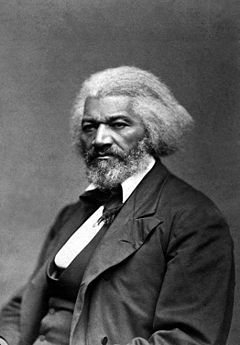
Davis was only too happy to accept their services. Their community leader, Douglas Whiteguy Frederick, had visited the Head Cheese prior to the French Surrender and demanded that he never send a black man to France or a black man trying-to-be-white to France either, saying that it would ruin their personal hygiene and also lead to a boom in cowardly, ugly, bad-cheese eating black kids too. The President agreed to that condition, provided that Federick do his part in helping emancipate runaway freedmen who kept trying to find a plantation and get re-enslaved.
In the meantime, General Cheese was working on plans to bring back the Confederates from France when the Yankees began their long-awaited Spring offensive. The plan was for the Union Commander, General Big Mac McClelland to land troops south of Richmond and march towards the Rebel capital. In the meantime, Union General Ham Burglar, was going to march south from Washington and the two would link up, kiss, and march together upon Richmond.
The Second Battle of Bull Squat[edit | edit source]
Davis, now that Generals Dweeb and Stoner were away making baskets in Iowa, asked General Cheese to take the field in person, a position which he was only to happy to accept since Davis recently got a fresh batch of Limburger from his plantation and was stinking up the Dull House and the capital. That gave Cheese a great idea. Appropriating all the excess Bubbas he could find, he sent them north under command of General Banger to delay passage of the Yankees. To the south east, Cheese deployed an entire division of troop and loaded their nap sacks with graters and Limburger. His plan, later known as the Grated Earth policy, was to cover the line of the Union advance with bad cheese and cause the army to turn back if not mutiny.
Both plans worked brilliantly. The 100,000 soldiers under Big Mac started vomiting enmasse as soon as they got downwind of Richmond. As they got closer, more and more of them fell ill, including Big Mac himself. This stalled the offensive long enough for the 200 men of the Free Black Division, under Frederick's son, Bud (protected by the smell by the use of cheddar cheese cloths over their mouths), to attack the Yankees on both flanks and down the middle. Using Limburger cheese-loaded artillery, which dated from the Crusades, the Free Black Division pelted the Yankees as they fled back towards their landing craft. This earned Bud the Confederate Congressional Medal of Honor and free bad milk baths for a year - old habits dye hard, as his father said.
In the north, Banger's forces deployed their Bubbas in a long line directly facing Virginia-Detroit (VD) railroad. As soon as the Union army approached they started to laugh hysterically. Rear units fell into forward units and one after the other the entire command of General Burglar fell into disorder. Then, from the left flank of the Yankees, the Free Black division, fresh from their grating of Big Mac, began their cheese bombardment. Suddenly, the Union soldiers smiles of laugher were replaced by the smell of bad cheese as it rained down upon them.
The Union army broke and fled the field, those that could run. Historian estimate that of the 10,000 Union soldiers engaged in this battle, the Union lost 11,000 with several surrendering twice because of the smell and also because they hadn't see a funny Bubba sine the war began. Losses for the South were five soldiers out of 100 engaged, and mostly to due to scrapes and bruises; the remainder were still in France, but were unable to leave.
The Aunt Tee Tum Campaign[edit | edit source]
Following the Second Battle of Bull Squat, the Confederate Army was feeling really, really good. General Cheese, however, felt that with all that limburger lying around the battlefield, it was not safe for his army to stay put. Sending a rider to the President Davis, he proposed moving north and launching an attack on Big Mac himself.
